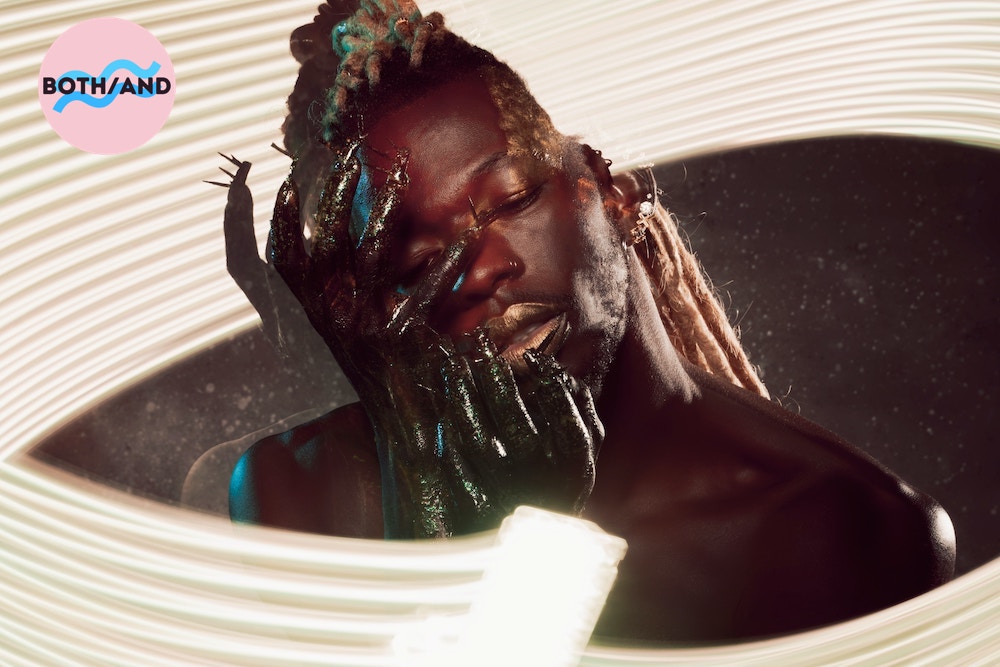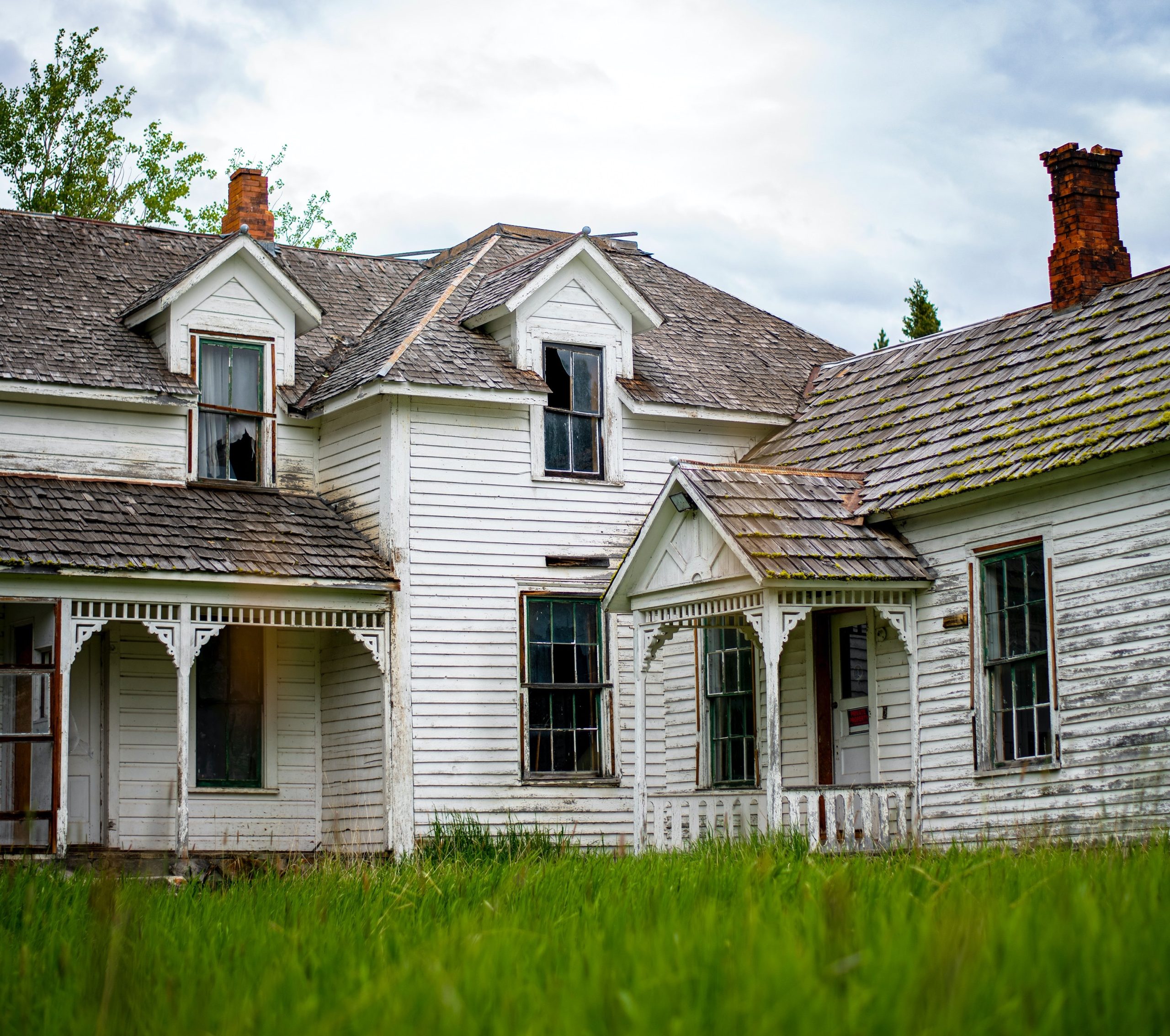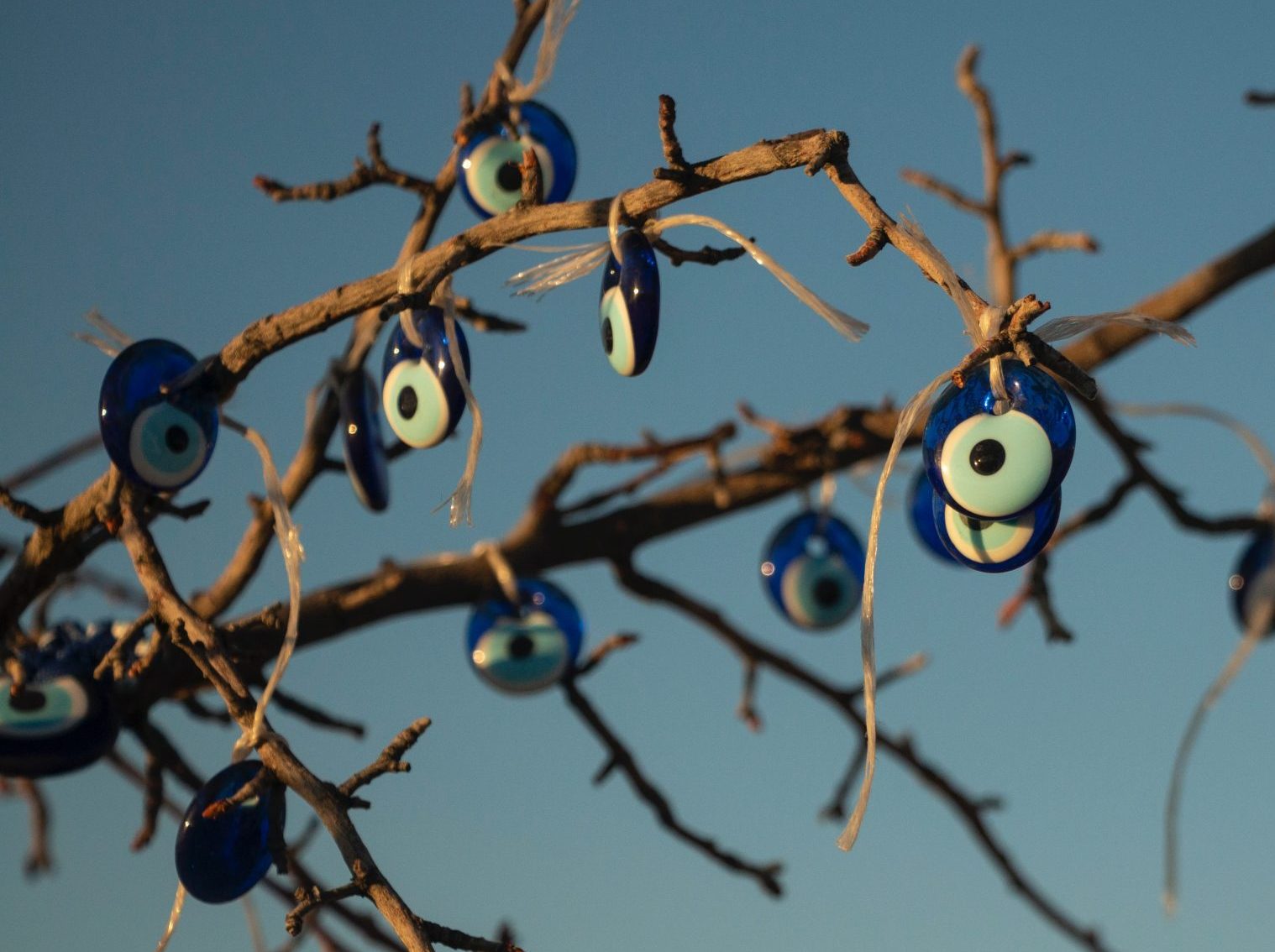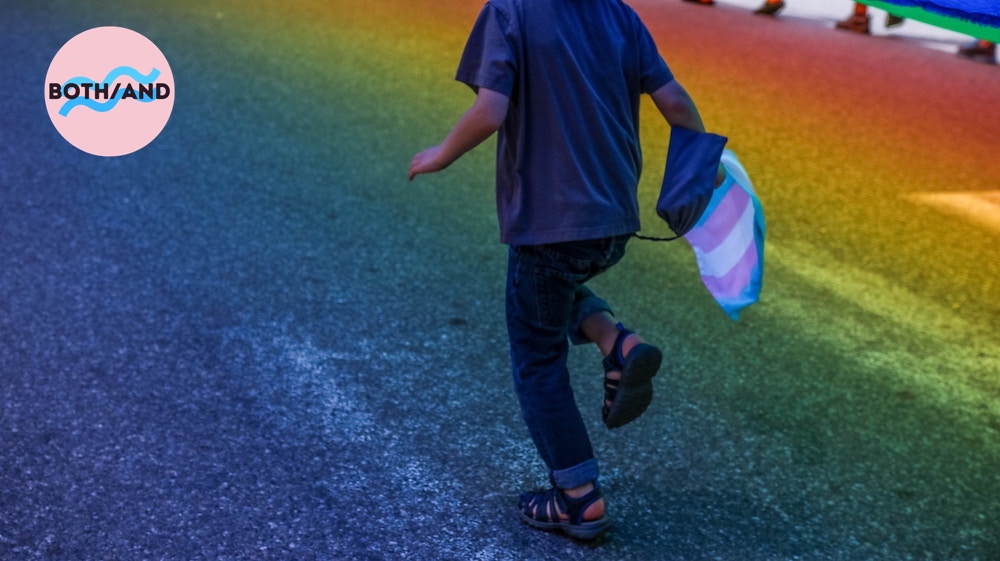Both/And
In My Worst Nightmares My Father Transitions
She apologizes for all the vitriol she flung at me, crying thick tears through false eyelashes

I. Father
In my worst nightmares, my father transitions.
In life, we are many years estranged, per his wishes. He has made his feelings on my ‘gender deviance’ clear. The fiery drama of the fallout of our nuclear family has long since cooled to ash, long held shouting matches stretched into years of silence.
And yet.
In these dreams, her beauty is effortless. She moves with supreme Black elegance, each gesture power incarnate. The perfect shade of foundation blends the sun-scarred skin of her forehead into her cheeks. A hairline I once watched recede is handily buried beneath luscious curls, voluminous as mine were before I hacked them off. Even her five o’clock shadow has been put to rest.
She kneels before me, her shimmering skirt unwrinkled by the movement. She holds my hands with nails lacquered violet.
My father always loved violet.
She apologizes for all the vitriol she ever flung at me, crying thick tears through false eyelashes. Gentle and contrite, she apologizes for calling me a cross-dresser, a dyke, a homosexual, a gender-bender, a transvestite. Through lips painted by artists, she begs for my forgiveness, admitting in the same breath that she could never earn it.
Her humility is palpable, as is her beauty. Her regret is tangible, as is her grace. I stand, stone-faced, and grant her no reprieve.
In my worst nightmares, my father transitions. There, she is a better person than me.
And she’s better at being trans than me.
II. Elder
My mother once told me, “You are your true self when you’re on a date with a boy. When you go too long without putting on makeup, it’s like you lose sight of who you really are.”
I sometimes wondered if my mother would’ve been happier with a mirror for a daughter. I know for a fact she would’ve been happier with a daughter, but we get what we get, and she got me.
I only rarely saw my mother without a full face of makeup, and never in the full force of natural daylight. She had the art form down pat, just a few moments needed before sunrise to put her face on. Bright lips, thin brows, plump lashes, foundation in the lightest shade on the market. She wanted the same for me, claiming that it was part of a woman’s hygiene. I refused, hence her insistence that I had lost sight of my true self.
Her humility is palpable, as is her beauty. Her regret is tangible, as is her grace.
To this day, I’ve never seen her natural hair color. She started dying it in high school. If photos existed of her any younger, I can’t recall them. Maybe I was never shown them. Her hair is the exact same shade of box blonde in her wedding photos as it will be the day of my disowning over two decades later.
She spends my childhood bemused by my mixed hair, constantly trying to tame it, straighten it, relax it, beat it into submission. Dye it to look like hers. She wrecks my curls, over and over, until I am big enough to hide, to force her to pick a different battle.
My father tells me I should be grateful. Girls are lucky, he says, that they get to wear makeup at all. He revels in the few opportunities he has to be on stage, eyeliner accentuating bright green eyes, blush high on his cheekbones.
We might show up late to church, but we look good when we get there. I am the eldest child of the lot of us, an octopus wrangling clip-on ties to shirt necks that refused to starch. The memories, resistant to chronology, swell and shrink. There’s four of us, then seven, then six. A slew of mixed kids, our hair brown and black and ginger, tan and pale and freckled, bookended by a pale black man in violet and a far paler white woman with box blonde hair.
After the sacrament, administered by teenage boys in ill-fitting black jackets, the congregation splits by gender, then by age. Gender lies at the center of Mormonism, so goes our scriptures.
I wore dresses, skirts, and kept my hair long enough to cover my shoulders and collarbone.
In the 90’s, church leaders said so explicitly in a document named The Family: A Proclamation to the World. “Gender is an essential characteristic of individual pre-mortal, mortal, and eternal identity and purpose”. Mormons the world over were to take that as eternally pertinent of a scripture as any line of the Bible. Eve supped on forbidden fruit, David kissed Jonathan, gender is who you are and why you exist.
Gender shone in every aspect of Mormon life. At church my brothers learned to rake, grill, hike, change tires, build fires, wield the mystical powers of the priesthood to heal the sick and raise a family.
My sisters and I learned to sew, knit, crochet, cook. I cleaned the building, gathering up the Nerf darts left behind from the boys’ playtimes. I minded children smaller than the child I was, mended skinned knees and scraped elbows. I wore dresses, skirts, and kept my hair long enough to cover my shoulders and collarbone.
A sincere devotee, I was prepared for the life ahead of me. Once a Mormon boy decided that I was a good enough match to raise a family with, I would bear his children. After death, his righteousness would earn him a planet, and I would fill it to the brim with offspring. Rumors swirled at summer camp that if a very kind husband found you, he might let you help pick out the planet’s name.
I hoped that our planet would be named something nice, and that my husband would be even nicer. Whenever I imagined him, he shone as a silhouette of blinding light, intangible and scalding.
That document was likely named The Family as it tackled another subject heavy on the minds and hearts of Mormons at the turn of the millennium. It opened with the line, “We… The Church of Jesus Christ of Latter-day Saints, solemnly proclaim that marriage between a man and a woman is ordained of God.”
III. Cover
I nightmare of three subjects. My father, Black and celestial. My mother, white and earthen. And the day following the day I got outed. My parents managed to corner and confront me during that brief visit home from college, a two-pronged attack.
The shocking revelation of my dykehood was an open secret only a Mormon’s mouth can hold. I watched in grotesque fascination as it bumped against my parents’ lips, carrot-raisin-lime-gelatin sloshing in their cheeks.
My father would proudly show off a photograph of the single night he spent in drag, some thirty years ago now.
I wound up, during this lecture turned terror, holding my youngest sibling, feeding them bottled formula. They were an infant I met a couple days prior. I was a college sophomore. The many siblings between us were hidden somewhere. Perhaps they lurked in the depths of the house, invisible witnesses to the lurid affair. Perhaps they were at school, oblivious to the whole thing.
I hold this child, a stranger, for the entirety of this memory, this nightmare, this horrifically mundane armageddon. Their weight pins me to a rickety rocking chair as the hours stretch on. Their sleepy peace keeps my voice small, my body still as I cradle them.
“Of all the childish choices,” says my father. He loves science fiction and fantasy. He probably would’ve loved the book I’m writing now, six years later. It has dragons, and wizards, and pigeons.
“You’re too young to know,” says my mother. She was married at 21. She had me at 22. She used to teach puppetry classes. She likes to sew costumes, astronauts and explorers and dragons. We all really like dragons.
“You’re rushing into this.” sighed my father.
“Being gay?” I whispered.
“You’re being so dramatic.” scolded my mother.
From their first date to their engagement, my parents courted for six weeks.
They were both enrolled in a theater program at a Mormon university, perfectly ensconced in a cocoon of faith and art. My father would proudly show off a photograph of the single night he spent in drag, some thirty years ago now. “I should’ve shaved my legs,” he’d always say. “I looked so wonderful. That hair, the lipstick, the fishnets. But I wish I’d shaved my legs!”
They met reading across each other for parts in a Shakespeare play, a moment so magical they could never remember the name of the play or the parts they read. Just their chemistry: they connected so resonantly that when they found themselves knee deep in a passionate argument on a stranger’s balcony months later, they knew their love was meant to be.
“You’ve always hated men,” says my father. He cites my middle school bullying, shoving boys half my size aside, wrenching their long hair to their knees.
“You’re taking the easy way out,” declared my mother. “Sure. Every girl wants to cut all her hair off and raise kids with her best friend. But growing up means making the responsible choice.”
In my teenage years, my mother expressed concerns over my having so many sapphic friends. She told me that they would need to make their choice soon, lest the rest of their life be doomed. “No one gets to stay a child forever. Growing up means choosing to be responsible. Choosing to love men. It’s what I did, just like everyone else.”
…the public did me the dubious honor of teaching me the lesson that it’s dangerous to look like me, to have my voice…
Slowly, over two and a half hours, the shape of it takes root. My parents are furious that I am refusing to make the difficult decision to eschew the temptations of homosexuality in favor of a righteous life of devotion to Mormon Jesus. They made their choice long ago in one another and have been donning masculinity and femininity and heteronormativity ever since. You, they point accusatory fingers at me, need to do the same.
Over the next couple of tumultuous years we will fight and scream and cry and bicker as my hair gets lopped off and my dresses become hand me downs and my earrings are converted into cufflinks. My father will rage when he sees unisex dress socks on a Christmas list, screaming that I’m not a man and I’ll never be one. My mother will cry when I tell her I won’t wear the glittery plaids she got me as a replacement for the thrifted flannels that swallowed my wardrobe in early college.
When I am inevitably, uproariously, explosively disowned, it is followed by the total silence of people who have said all they needed to say.
IV. Other
A molecular biologist, I dutifully spend a chunk of the pandemic in laboratories, hunched over benches, scrubbing the body raw. Afterwards I bounce from gig to gig. Retail. Childcare. Freelance copywriting. Substitute teaching.
My friends, my loved ones ask if I’m sure, if it’s worth the risk. I’m an obnoxiously effusive type, so social jobs suit me well. But the last time I worked retail, the public did me the dubious honor of teaching me the lesson that it’s dangerous to look like me, to have my voice, and most of all to use it.
They’re just kids, I remind my friends. There’s nothing a thirteen year old can do to hurt me worse than the grown man who dropped a fridge on me when he heard my butch body speak in soprano.
That dissonance visibly resonants in my reflection as I array myself carefully, the attention of a bomb defuser trained on an outfit assembled from Walmart clearance and Ross.
Shoes too long in the toe and too stubby in the ball have been my companion for seven moves, going on eight next month. I tug on a thrifted polo, scratchy despite the softener I’ve thrown at it.
I’ve done my best to take in the khakis, but the stitches are visible in places that make the amateur alterations uncomfortably obvious. The hems are both uneven and far too high, showing off, depending on the day, several inches of novelty Pikachu socks or my unshaved calves. The good dress socks are in the wash, of course. I also somehow misaligned the sewing on the seat of this pair of pants, so it’s somehow both too baggy and yet too tight on the crack. Meant for a different set of equipment, not meant for my curves, not meant to hold me.
Once upon a time, when my body stretched and swelled, my mother sewed clothes to flatter it. She made me dresses and blouses that fit. My brothers wore hand tailored vests, my father’s pants mended and hemmed.
She messaged me on LinkedIn for my birthday this past year, one of the few digital places I had overlooked in the four years since our estrangement. The message sat unopened, but I looked at the sewing machine, the too-short pants with uneven hems. Wondered about a family in perfectly tailored clothes, perfectly flattering their bodies.
I wondered what my mother would look like in a suit.
A different superior, a different job, a different parent, complaining about my existence being ‘age inappropriate’.
That hair that was the subject of so many fights with my parents has been dyed to hell now, curls murdered by bleach and only now gasping back to life. The sunshine yellow of the summer is resistant to resurrection, but I’m trying to keep it up till the holidays. The kids love the yellow, especially the little ones, and it’s been a long season for them.
Now low on time and rushing, I pin my custom name tag on. It only lists a little over the lycra of my exhausted sports bra.
Mx. Ball
They/Them
No, the kids were nothing to be afraid of.
The adults, on the other hand:
When the local high school principal called me, he spoke carefully, each word measured. I tried to match his pace, unsure of my footing. A rookie substitute teacher in a large district could hardly feel that this call was a good omen.
A parent had contacted him and the school multiple times in the past day to complain about…the man hesitates.
Each of the following syllables rolls off his tongue like boulders. “It’s my understanding that you use they and them pronouns?”
My stomach drops. Ah. This again.
That awkward, and ultimately pointless, phone call with the principal was the second incident in the last six months. A different superior, a different job, a different parent, complaining about my existence being ‘age inappropriate’. “Gender,” says the last boss, “is just something we don’t talk about here.”
“I’m not bringing it up,” I desperately wanted to make eye contact with her. I can’t look up from my shoes. “The kids keep asking.”
The ghost of my mother, reaming out a superintendent, hovers over my right shoulder, ranting about school bus safety. Someone’s getting fired tomorrow.
A manager rolls their eyes at me when I correct them, sotto voce. He tells me that it’s not grammatically correct to be multiple people.
The ghost of my father stands thunderously before me. Dictionaries are splayed next to him, Webster wielded like a rapier.
My parents were educators. Probably still are. That’s a quirk of estrangement, people wind up caught in amber the moment of relationship terminus.
…when I think of my grandparents I still remember their tiny chunk of bay on the west end of Puget Sound.
I’ve attended their classes, their lectures, their sermons. Watched them gather up a disparate audience and palm them, turn a room on the pad of their finger. Laugh, commands my father, and the room erupts. Weep, sniffles my mother, and the crowd is somber.
They’d be better at this, nags the flash of myself warped in car windows, the glimmer of a person in the cheap plastic of a child’s sunglasses.
They’d stand up for themselves, I sigh as another diversity and inclusion coordinator calls me an upstanding young woman.
They’d have something to say, something quick and bright and real.
They’d sew perfect clothes, strike perfect poses, speak in perfect voices.
They’d be better at this, as men or women or whatever oddity I am.
They’d overtake me in an instant.
V. Mother
Dreams of my mother find us walking on the rocky beach of her parents’ old home. They moved out of that wooden house years ago, but when I think of my grandparents I still remember their tiny chunk of bay on the west end of Puget Sound.
Baby girl of six brothers, my mother is dressed in obvious hand-me-downs. A canvas jacket sits heavy on her collarbone, a thick flannel poking out past her hips. She moves with surety in thick galoshes across the uneven beach. Her hair is tucked under a handmade beanie, Seahawks green and blue. She smells like grit and sulfur, a slight tint of shrimpy wet coming in from the west.
Gentle, she calms the whale, rubbing at the sore areas where craggy rock has torn at marine hide.
On our trek, I stuff my pockets with every chunk of beach that glimmers. Quickly I am bow legged from the weight of them, and look to my mother for her help in carrying my quickly expounding bounty of treasures. “Mom-”
“Shh.” Her attention is trained on the mouth of the bay. Her cheeks are pockmarked. She has crow’s feet. She wears no mascara, no lipstick. She’s wearing glasses.
I’m smug with her. “I thought you had 20/20.” I’ve needed mine since I was six. She lorded her perfect vision over me.
She rolls her eyes, pointing with one hand, the other reaching for a holster on her belt. “I needed to watch the whale.”
It was a legend in our home. Once, when my mother was a teen, a juvenile whale got wedged in the tiny bay in my grandparents’ backyard. It fell to them and the neighbors to keep her calm, keep her wet, and holler at the idiot Coast Guard for trying to bring their massive honking ships into tiny inlets they wouldn’t be able to maneuver out of.
Now I can see it too, the whale trapped in a deceptively inviting inlet at the north end of the bay. She thrashes, weeps, splashing and screaming and crying.
My mother moves down the beach in a way I didn’t know her legs moved, the way Paul Bunyan ate up the country, the way a railroad moves a family from New York to Missouri, the way a road trip brings you home. She wades into the water, taller than an evergreen, as mighty as her lumberjack father, arms wide for the trapped beast. Gentle, she calms the whale, rubbing at the sore areas where craggy rock has torn at marine hide.
My mother takes a few steps back, stance firm, galoshes steady. At her belt materializes a rope, spun from pine needles and spidersilk, the corners of my grandparents’ basement. With a heaving motion, the whale is wrangled, the rope thrown over my mother’s shoulder.
Knees bent, head down, body set, my mother begins to heave. Step by herculean step, the whale is pulled through the shallow bay according to her will, by the power of her determination. Her cheeks flush red from the effort. Her temples bulge. She snorts and grunts and sweats.
Halfway through her journey, a jostle of the rope whips her beanie off. For the first time in my life, I see my mother’s natural hair color.
It’s the same as mine.
VI. Further
My suit, a deep emerald, slips on perfectly. A discerning eye can tell that it was tailored by someone minding my curves, squaring my shoulders, tapering to my calves. Silky florals flare in the lining of the jacket, more color than most men would ever dare.
It brings out the green in my eyes, an echo of my father’s own. The parchment button up sits on my hips just like the blouses my mother once sewed for me. When I take up the arm of my lover that night, my gold bangles will clang against their own jewelry, matching gold embroidery on their dress. We will dazzle, and network, and delight. We’ll fling coded words past oblivious ears, knowing that even now we and our people live on the fringes of visibility, able to speak to one another privately in a crowded room.
If eyes narrow, if offered handshakes are rebuffed, if shoulders get bumped, I ignore them. It’s a talent of mine, well practiced and often called upon. I perfected it on walks late at night, at long shifts behind the register, in line at the bank, at countless tribunals of the public eye. Go on, my smile dares them. Give me, dyed hair and soft chest and high voice and all, a chance to be the bigger man.
Those people never existed, and I am here, putting one sore foot in front of the other.
The children are starting to recognize me, towering above their teachers, booming voice and bright colors undeniable. I made a new friend down in Denver, and he says he’ll coach me on hemming sometime in the new year. In the meantime I got new socks, boisterous and colorful. I affix my nametag, speak my name clearly. Half the time now the children have already alerted one another long before I get there-
“Oh, oh, it’s mix ball today.”
Little ones quietly pass me scraps of paper, pronouns scrawled in mechanical pencil. A young man pulls me aside to ask about binders, and hormones, and how I got so tall. Secret names are whispered to me, treasures received with the greatest of reverence.
I still, on occasion, catch glimpses of a diaphanous femme father in the sweet turn of my lips. Hints of a butch mother can still be found between my set shoulders, shifting to bear heavy burdens. But a simple examination of the wearing of the tread of my work boots serves as refutation to years of maladaptive fantasy. Those people never existed, and I am here, putting one sore foot in front of the other.
In my worst nightmares, my father transitions.
In my wildest dreams, my father transitions.
When I awaken, my father is but a man.
In a kinder world, my mother and my father have different titles, or the same ones. They got to be mother-fathers and father-mothers. They got to wear dresses and suits and makeup and neckties. They got to experiment with their genders in college and realized that they were happy as they were. They got to experiment in college and realized that the roles that they had been taught could never contain the magnitude of human spirit spilling out of them.
In a kinder world I am coached through a life beyond a binary by two people who never fit in one to begin with.
In this world, those of us who chose to sow transformation reap trans joy.
In this world, I am what they never had the strength, or love, or balls to be.








